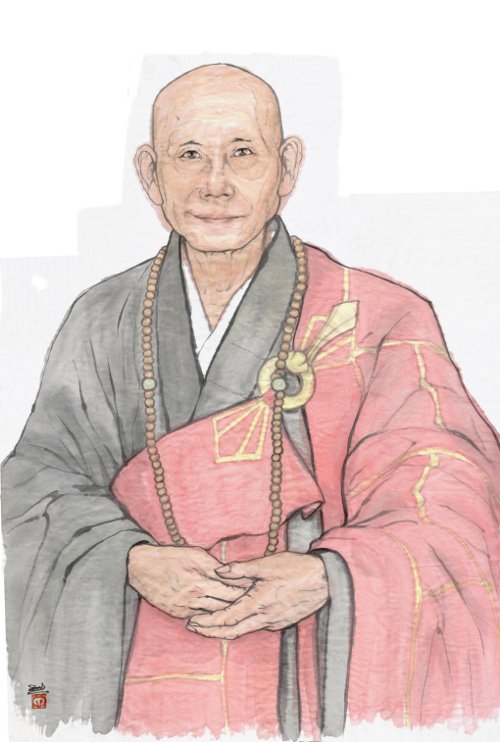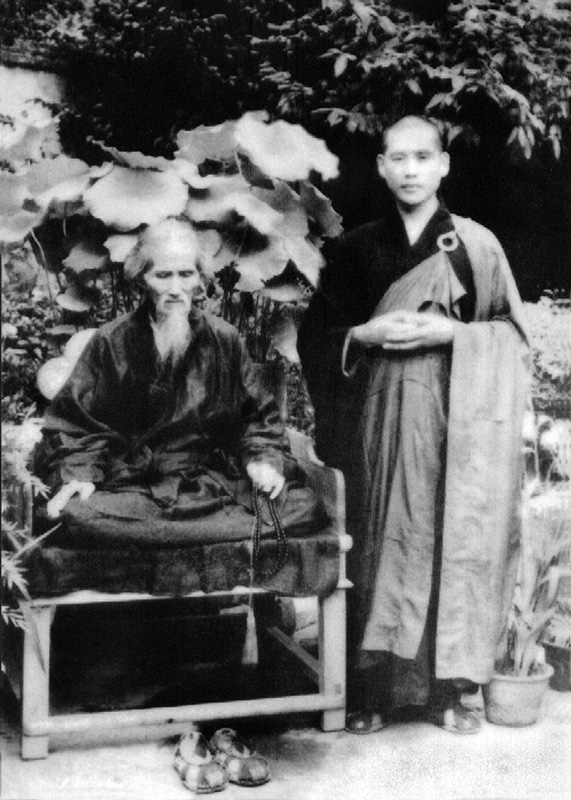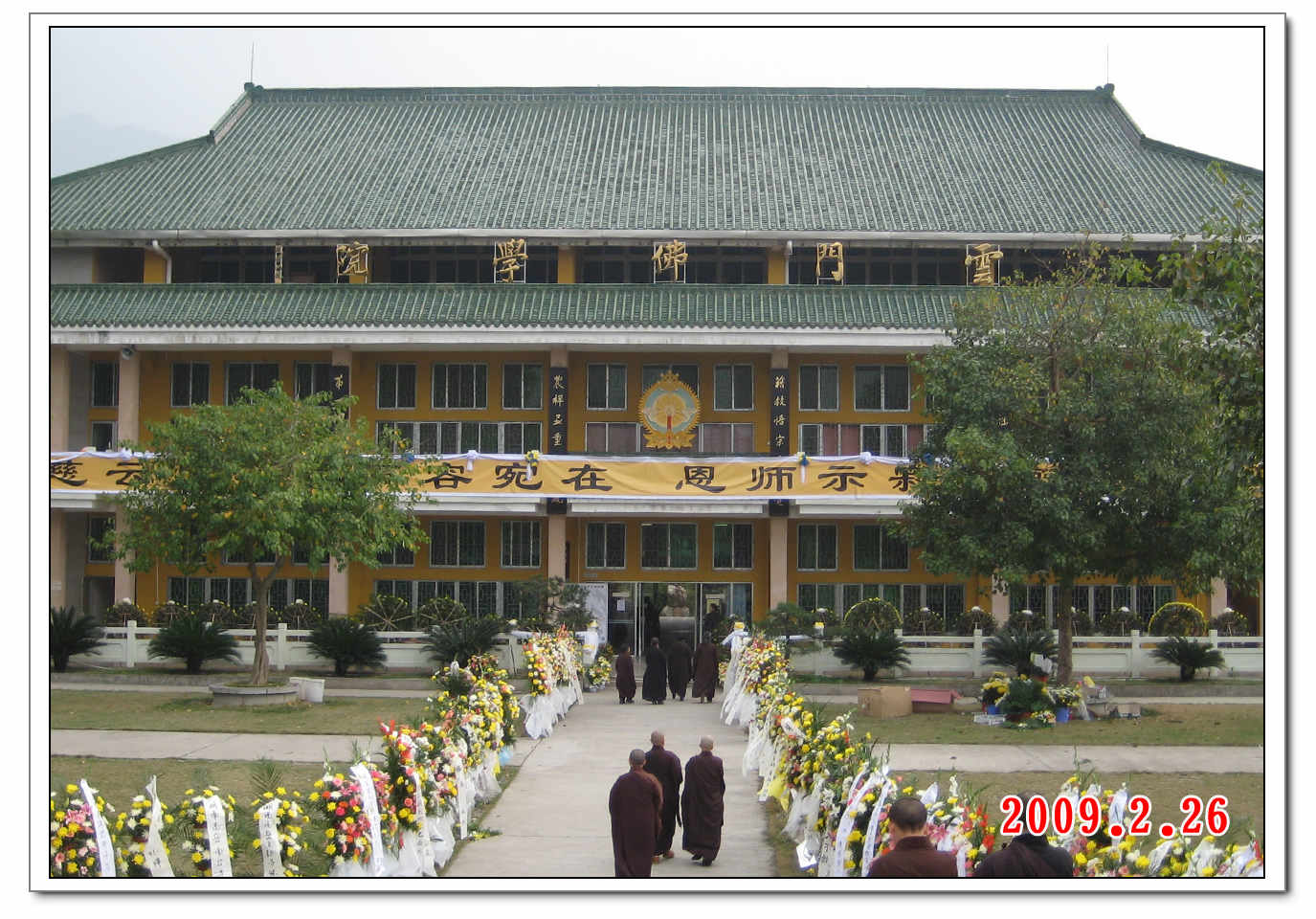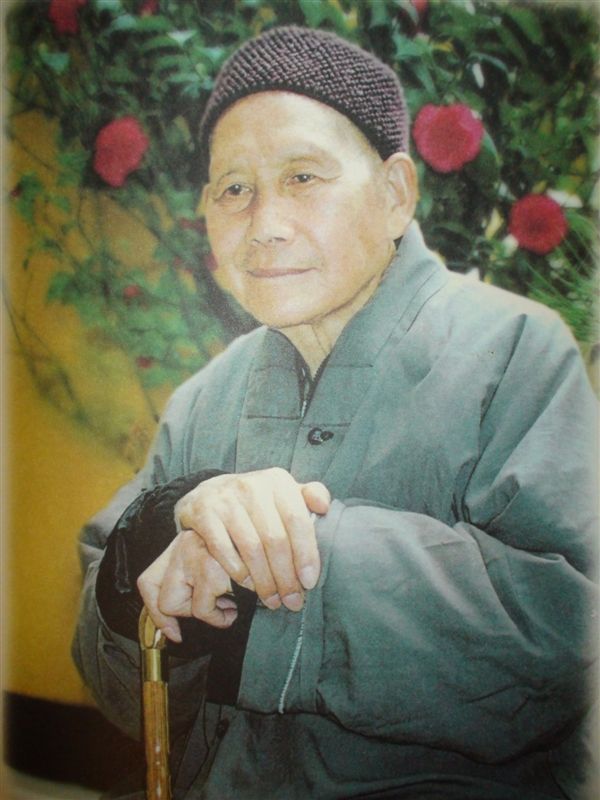IN MEMORIAM
 Master Fo Yuan
Master Fo Yuan1923 - 2009
Watercolor by Fa Ming Shakya dasmara@gmail.com.
Zen Buddhism has lost a great Saint.
In the evening of February 26th, 2009, Master Fo Yuan, 13th Patriarch of the Yun Men Lineage, died quietly in his sleep. He was eighty-six years old.
The world did not know much about Fo Yuan. The years of his greatest contributions were years in which China closed its windows and doors to the rest of mankind. Only a few privileged souls were able to appreciate how much of the distant horizon his intellect and his innate goodness allowed him to see.
When the war with Japan had finally ended, in 1946 when Master was only twenty-three, he began a period of intense Zen training with Master Tai Xu that enabled him to speak authoritatively on the Amitabha Sutra. Though he often lectured on this sutra and his reputation quickly grew, he was not satisfied with the clarity of his own insights. In 1951 he journeyed to Yun Men Temple and placed himself at the feet of Xu Yun.
 Masters Xu Yun and Fo Yuan
Masters Xu Yun and Fo Yuan
Xu Yun could always see through the Buddha's eyes. On June 19th of that year, he named his new disciple, Fo Yuan, Fo meaning Buddha and Yuan meaning Fountainhead; and he declared that Fo Yuan would be the new head monk at Yun Men.
The following year, 1952, Premier Zhou En Lai invited Master Xu Yun to come to Beijing as his guest. Master Fo Yuan accompanied Xu Yun as his personal attendant. The impression these two humble Buddhist clerics made upon the first Premier of the People's Republic of China cannot be underestimated. It was Zhou En Lai who brought China to the 1954 Geneva Conference and who valiantly opposed the 1966 Red Guards' wanton destruction of China's great heritage. Those Buddhist clerics and temples that survived owe their continued existence to this cosmopolitan premier who sought to learn Buddhist ideals from Xu Yun and Fo Yuan. And it was Zhou En Lai who oversaw the Ping Pong Diplomacy that healed the wounds between the U.S. and China and enabled President Richard Nixon to visit China in 1972.
In 1958, in Guang Dong Province, far from Beijing, atheist officials, in an attempt to discredit Xu Yun, ordered Fo Yuan to testify against him or else face imprisonment. Fo Yuan refused; and in 1959, as Xu Yun lay dying, Fo Yuan was imprisoned.
Though ordered, in 1961, that he be released from jail, the officials were still able to keep him confined in forced labor as a farm hand in the agricultural lands surrounding Nan Hua Temple. For eighteen years he labored under extreme hardships, often becoming gravely ill from the privations. His spirit, however, never weakened, and in defiance of the edicts against religious expression, he softly recited his beloved sutras every day, especially that of the "Earth Store Bodhisattva," Ksitigarbha: the Bodhisattva who went to Hell. Ksitigarbha, had vowed to save the worst of sinners, asking, "If I do not go to hell to help them, who else will go?" We can easily imagine who the sinners were for whom Fo Yuan prayed.
 Funeral procession at Yun Men Temple.
Funeral procession at Yun Men Temple.
It was not until 1979, when religious liberty returned to China, that Master Fo Yuan regained his freedom. Immediately he undertook the reconstruction of Yun Men temple which had been destroyed by the Red Guards, and the fulfillment of Xu Yun's wish that he revive the ancient lineage of Master Yun Men (Ummon) by becoming the 13th Patriarch of that line.
Officially, he became Abbot; and during his abbacy, Yun Men Temple surpassed its former glory.
Many stories are told about this most practical of holy men:
One day he admonished a monk for his excessive austerities. "Look at yourself! You're only sixty yet you look more than eighty! You never nap or take a rest period. You never eat anything except lettuce. What are you thinking? Don't you know the Buddha taught that we should eat when we are hungry and we should rest when we are tired. Of all the Buddha's teachings, this one is the easiest to follow. Why do you disobey it?" The monk suddenly realized the arrogance of his austerities.
 Master Fo Yuan, later in life.
Master Fo Yuan, later in life.
On the other hand, he disliked pious displays. One day, while watching a nun work in the garden, he observed her reverently remove an insect from a vegetable plant. "What are you doing?," he asked. The nun replied, "I'm getting rid of a harmful insect." "Ah," said Master, "and then what will you do with it?" The nun looked around at the vast farmlands surrounding the temple. "Why, I'll carry it up the mountain and then release it," she said. Fo Yuan, no doubt recalling his time of hardship, shook his head. He looked at the insect. "Why don't you roast and eat it?" he suggested. The nun was shocked; but on that day she learned about false piety and the hard choices we must make to survive.
One night he and a young attendant were outside working. The attendant was tired and irritable. "It's getting late, Master!" he complained. "Isn't it about time we went home?" Then, not wishing to seem lazy or derelict in his duty, he added, "There's plenty of work we can do there." Master Fo Yuan smiled. "I don't have a home to go to," he said, "do you?" The young attendant understood that when we work in the Buddha's Refuge, all places are the same.
On one rainy day while walking outdoors, Fo Yuan's attendant tried to slow him down, cautioning, "Master, the road is very slippery. Please be careful where you step." But Master had an appointment to keep. "Don't worry," he chided. "Anywhere you fall is anywhere you get back up" The attendant wisely saw that great men sweep away obstacles.
My own favorite recollection of him has no great instruction in it. At Yun Men Temple, in a well crafted concrete pit just below ground level, there was, I thought, the statue of a large tortoise. One day, I was standing near the pit when I saw Master approach. He took cabbage leaves from a sack and tossed them down into the pit. I leaned over the rail wondering why he'd do that. Suddenly, the statue came to life and the tortoise stuck its head out. I was so surprised, I shrieked a little. In English I blurted, "I had no idea it was alive!" Master didn't speak any English but he understood perfectly what I said, and so we both laughed at my "sudden enlightenment."
Finally, I shall not forget how our own Abbot John was so gratified to learn that both he and Master Fo Yuan shared the same favorite sutra: The Avatamsaka (Flower Ornament). I remembered the old advertising line: "Great men think alike," I reminded Abbot John of that, and he grinned.
All the Mings and Yaos of the Western Hemisphere and elsewhere on this planet who are the disciples of Fo Yuan shall miss him more than we can say.
- Ming Zhen Shakya, O.H.Y. (Nevada)
